In
the afternoon of April 26th, At the Saigon Exhibition & Convention Center
(SECC), the HCMC Department of Tourism and the representative office of
Singapore Exhibition Services Co., Ltd held a seminar called "Promoting
Vietnamese culinary value in shaping and developing tourism in Ho Chi Minh
City”, which aimed at building and raising the value of Vietnamese cuisine in
the eyes of tourist from all the world.
Let’s the cuisine be
our national brand’s ambassador
Cuisine
is an important element to build up the culture and attraction of a nation.
During 4,000 years, Vietnamese have been created so much good food, which
carries intensive marks of their regions.
In
a presentation on Vietnamese Food History and Cultures - The cornerstone of Vietnamese
lifestyles, Paul Le – General Secretary of the Escoffier Food Association, Vice
President of Retail Support - Central Group said, “Throughout a long history,
among the ruling classes from the North to the West, France left the deepest
imprint in Vietnamese culinary culture. These ups and downs have made Vietnam
to become a well blend of various and diverse culinary cultures."
According
to Paul Le, modern lifestyle brings us plenty ways to enjoy culinary world,
from street food to fine cuisine of professional or Michelin chefs. All
historical elements including culinary culture and our lifestyles, especially
in Ho Chi Minh city, are authentic ingredients for “Vietnamese lifestyle”.
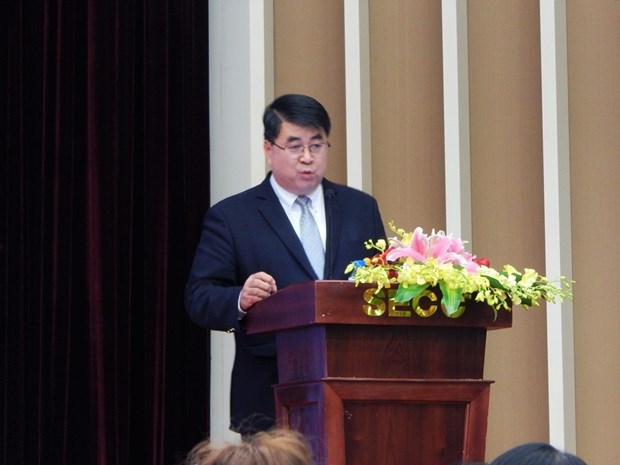
Mr. Paul Le - General Secretary of the Escoffier Food Association, Vice President of Retail Support, Central Group – praised Vietnamese culinary culture for its abundance and diversity in both spices and specialties
In
fact, cuisine and tourism always stick together. Tourists are willing to taste
new dishes during their trips because, psychologically, it’s a part of
travelling experiences.
Cuisine
also plays as a distinguisher among countries because food always comes with
flavors, cooking arts, and names of its country. It simply leaves a mark in
tourists’ minds and helps them to decide whether they would come back a place
or a country for leisure and discovery.
According
to Nguyen Quoc Ky, Chairman of the Board of Directors / General Director of
Vietravel Tourism company, in recent years, Ho Chi Minh City has pushed the
development of tourism promotion programs, in which cuisine is treated as an
important tourism product, such as Festival of International Delicious,
Southern Food Festival, and Southern Fruit Festival.
However,
the number of such programs is still small and the scales were not outstanding
enough to impress visitors. Ho Chi Minh city still lacks of introductory
locations where tourists can get information about historical and recent
culinary documents. Furthermore, although street food stands on their local
food, street vendors can’t keep food safety and proper prices as they should
be.
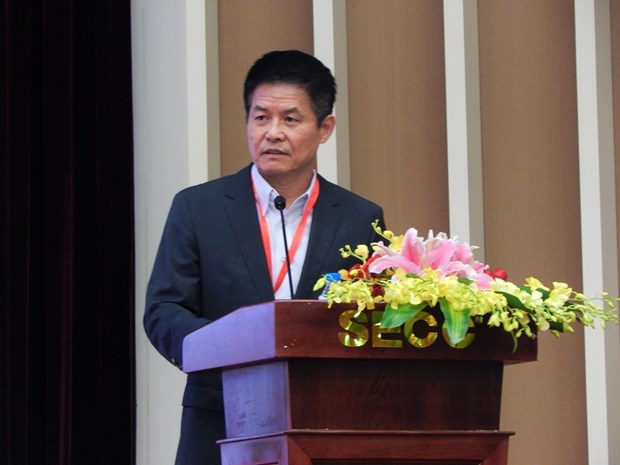
Mr. Nguyen Quoc Ky assured that Vietnam need to successfully build up its tourism brand.
He
suggested, “Even though it’s inherited different food backgrounds, Ho Chi Minh
city’s culinary culture has not really focused to make an outstanding
remarkable point. Therefore, we have to reasonably zone food courts or night
food markets for tourists.
Besides,
tourism and Vietnamese cuisine should be advertised together. Tourism companies
could open more food tours in HCMC, such as buffet night markets.”
He
also thought that Department of Tourism should have encouraged restaurants to
serve traditional dishes and should have organized food festivals or culinary contests
at international level in order to honor chefs, food experts, and cooking
career.
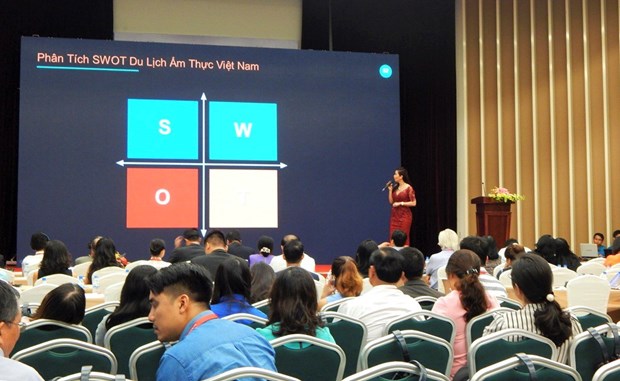
During
the seminar, delegates discussed about the important role of communication in
advertising Vietnamese culinary culture to the world.
Ms.
Nguyen Thu Huong - General Director of Nam Huong Investment and Communications
JSC said, “Vietnamese food is appreciated because of its freshness,
transparency, and harmonic flavors. However, according to surveys,
international tourists only have known several typical dishes, such as phở, chả giò (fried rolls), and bánh mì (French bread). It means we do
have boundary around our real diverse and abundant cuisine.”
She
also gave examples of countries that have developed culinary cultures through
communication, such as Korea or Japan. Korea has had a logical communicating
strategy for their tourism, especially tourism with traditional cuisine. From
TV series like Dae Jang Geum or Kim-chee Family to reality shows, Korea has
brought their pride – traditional kim-chee – to the world.
Therefore,
to elevate the images of Vietnamese cuisine, Mrs. Huong thought that we should
have, through communication, built an international standard for qualified
restaurants on prices, services, and utilities. We also could use recent social
networks, fan pages, and hot bloggers to create stunning TVC about remarkable
and highlighted aspects of Vietnamese tourism and cuisine.
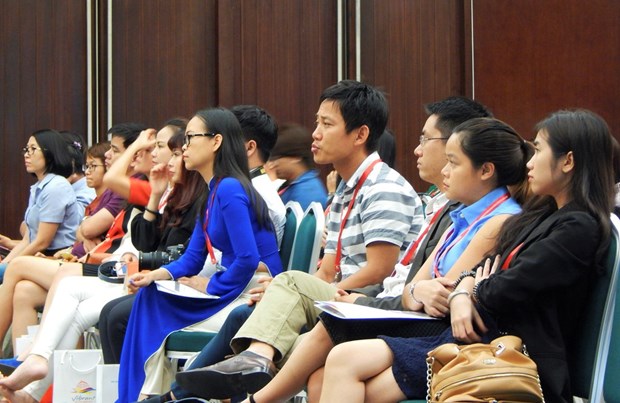
Delegates attentively observed presentations.
Cooking is not a
dirty job
In
the second part of the seminar, delegates had a chance to directly discuss with
experts about issues related to modern culinary culture.
To
turn cuisine into culinary arts and to introduce fine cuisine to the world,
chefs must be counted. Most people simply think that chefs’ job is to cook.
Indeed, a person who seriously takes cooking as his career must go through a
long and challenging road.
Mr.
Ly Huy Sang - Deputy General Director of Minh Long I Co., Ltd - Vice Chairman
of the Organizing Committee of the Golden Spoon contest said, “Vietnamese
cuisine is a primitive treasure with lots of hidden specialties and spices. In
fact, Korean, Thai, or French food is so trendy recently, especially with young
generation that Vietnamese food has been forgotten. The most important issue
here is cooking career has not been respected enough from society.
Even
when winners of The Golden Spoon contest performed cooking skills, people
didn’t really care. We really need to change our social prejudices so that our
chefs can be proud of their chosen career.”
“Therefore,
The Golden Spoon contest was held to honor cooking career. In near future, we
hope that we can support more to bring our contest up to international level in
order to introduce Vietnamese cuisine.”, shared Mr. Sang.
According
to Mr. Han Nguyen Nguyen Nha - Head of the Vietnam Kitchen Project - Kitchen of
the World, former director of Vietnamese Institute of Culinary Research, there
is no potential place better than Phan Xich Long area in HCMC. They can build
food villages here, where is the most convenient for all types of
transportation. From what has been going around that area, if it is zoned, it
can be the biggest food village of the country, or in the Southeast Asia, or
even of the world.
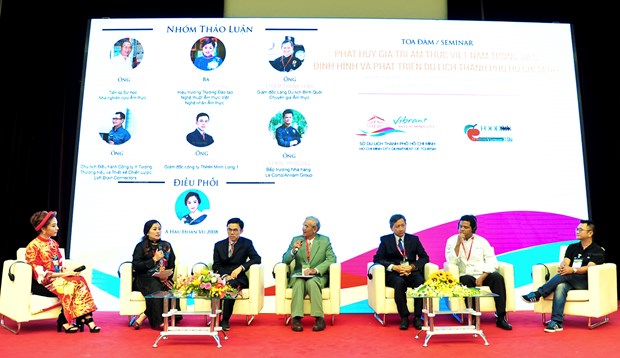
In the second part of the seminar, delegates had a chance to directly discuss with experts about issues related to modern culinary culture. Photo: Huu Long
Mr.
Pham Viet Anh, Left Brain Connectors’ founder, thought that stories of culture
were always the attractive nature for tourism in order to promote Vietnamese
images in general and images of HCMC, too. In theory, if pavements in HCMC or
in Hanoi are similar to Bangkok or Singapore, tourists might not go to Vietnam
after visiting similar countries, and vice versus.
“Besides
cleaning and adjusting urban order, managing sidewalk, the city needs to
consider solutions for existing street vendors, trading on pavement in
frameworks to maintain a folk trading culture. It attracts visitors and creates
favorable conditions for the people to stabilize their lives”, suggested Mr.
Anh.
From
all delegates’ opinions, Mr. La Quoc Khanh, deputy director of Ho Chi Minh City
Tourism Department, said that the city would plan to zone specific areas for
street food vendors and encourage investors of chains of restaurants to carry
the traditional breath of each region as a highlight of city tours, from which
tour operators will self-identify the routes to exploit, contributing to
promote and introduce Vietnamese cuisine.
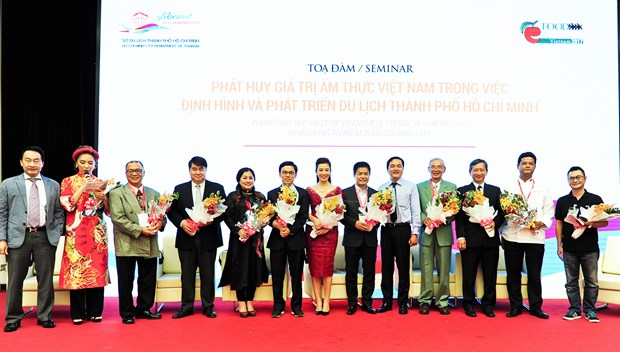
Representatives of Ho Chi Minh City Department of Tourism give flowers to the speakers. Photo: Huu Long
By Phuong
Nguyen/ Alobacsi